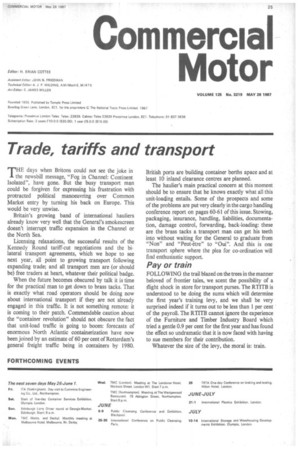Trade, tariffs and transport
Page 27

If you've noticed an error in this article please click here to report it so we can fix it.
THE days when Britons could not see the joke in the newsbill message, "Fog in Channel: Continent Isolated", have gone. But the busy transport man could be forgiven for expressing his frustration with protracted political manoeuvring over Common Market entry by turning his back on Europe. This would be very unwise.
Britain's growing band of international hauliers already know very well that the General's smokescreen doesn't interrupt traffic expansion in the Channel or the North Sea.
Licensing relaxations, the successful results of the Kennedy Round tariff-cut negotiations and the bilateral transport agreements, which we hope to see next year, all point to growing transport following expanding trade; and all transport men are (or should be) free traders at heart, whatever their political badge.
When the future becomes obscured by talk it is time for the practical man to get down to brass tacks. That is exactly what road operators should be doing now about international transport if they are not already engaged in this traffic. It is not something remote: it is coming to their patch. Commendable caution about the "container revolution" should not obscure the fact that unit-load traffic is going to boom: forecasts of enormous North Atlantic containerization have now been joined by an estimate of 60 per cent of Rotterdam's general freight traffic being in containers by 1980. British ports are building container berths apace and at least 10 inland clearance centres are planned.
The haulier's main practical concern at this moment should be to ensure that he knows exactly what all this unit-loading entails. Some of the prospects and some of the problems are put very clearly in the cargo handling conference report on pages 60-61 of this issue. Stowing, packaging, insurance, handling, liabilities, documentation, damage control, forwarding, back-loading: these are the brass tacks a transport man can get his teeth into without waiting for the General to graduate from "Non" and "Peut-etre" to "Oui". And this is one transport sphere where the plea for co-ordination will find enthusiastic support.
Pay or train
FOLLOWING the trail blazed on the trees in the manner beloved of frontier tales, we scent the possibility of a slight shock in store for transport purses. The RTITB is understood to be doing the sums which will determine the first year's training levy, and we shall be very surprised indeed if it turns out to be less than 1 per cent of the payroll. The RTITB cannot ignore the experience of the Furniture and Timber Industry Board which tried a gentle 0.9 per cent for the first year and has found the effect so undramatic that it is now faced with having to sue members for their contribution.
Whatever the size of the levy, the moral is: train.












































































































